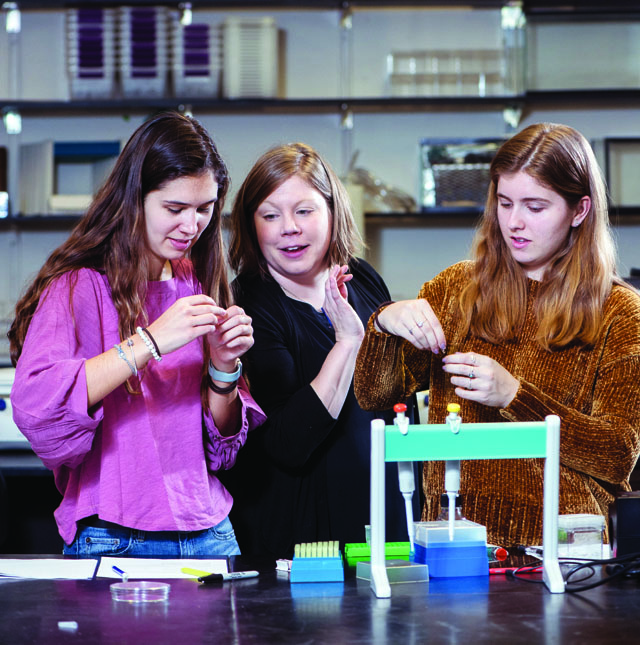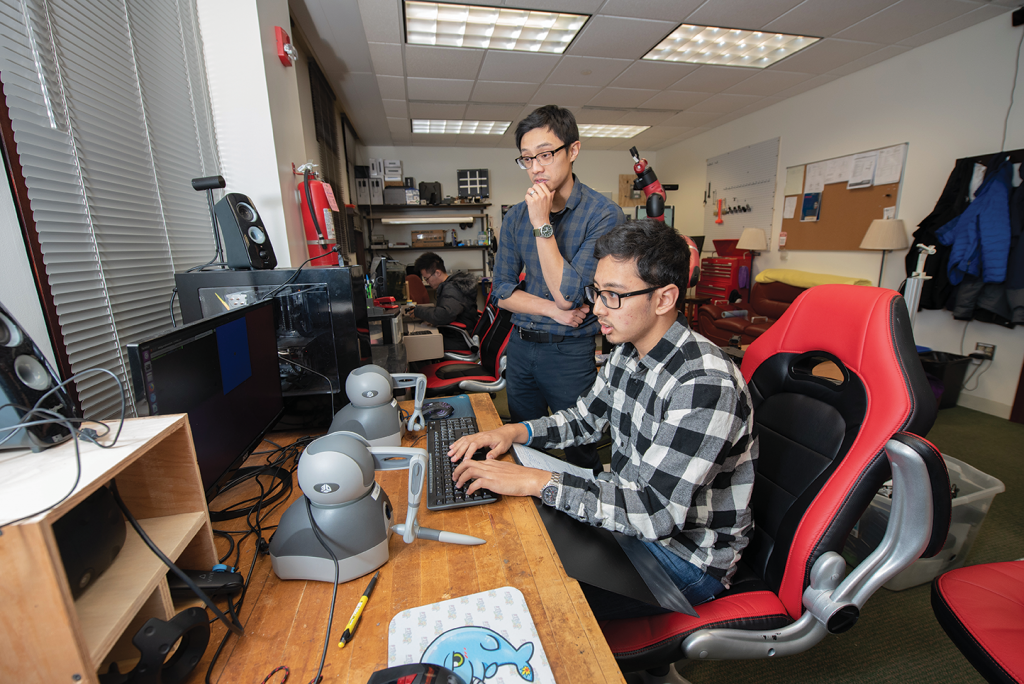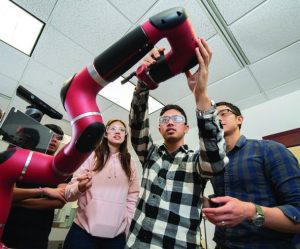First-year students explore connections, dive into research, and learn ‘how science is done’

By Andrew J. Concatelli
“Everything is connected,” says Alison Draper, the director of Trinity College’s Center for Interdisciplinary Science. And it’s those connections that Draper emphasizes to first-year students early in the Interdisciplinary Science Program (ISP).
ISP broadens and enriches the study of science and mathematics by exploring the connections between the scientific disciplines and with the world at large. It connects like-minded students with each other and with alumni, and it demonstrates the crucial connection between writing and the scientific process. It even shows how a string of failed research projects may eventually connect to a successful one.
The lessons and experiences are designed to give students a deep understanding of what Draper describes as “how science is done” and to do so on an earlier timeline than most of their peers at other institutions. “ISP students are much better prepared no matter what they go on to, whether it’s to medical school, graduate school, or a job where there’s some aspect of science,” Draper says. “They get how the whole profession works.”
The core of ISP consists of a seminar and a research apprenticeship, both in a student’s first year, followed by a course investigating the interactions of science and society. Designed by faculty and launched in 1991, ISP is open to a select group of students who have exceptional scientific aptitude. “The faculty had two goals in mind,” Draper says. “One was early research—getting students into that lab in the first year. The second goal was connecting science and society. I’ve really taken that as my charge.”
ISP is one of six Gateway Programs at Trinity designed for highly motivated first-year students (please see page 29 for a list of programs). Anne Lambright, dean of academic affairs and professor of language and culture studies, says that the Gateway Programs offer opportunities for students to pursue an academic interest in depth early in their college career. “They provide a cohort of peers with like interests and an instant intellectual and social community upon arrival at Trinity,” Lambright says. In the case of ISP, she adds, students learn about science and society from a wide range of perspectives, which allows them to appreciate complex issues. “Additionally, the ISP research experiences make these students excellent candidates for graduate schools and for professions in the sciences,” she says.
In Draper’s 16 years at Trinity, she has led more than 350 first-year students from 34 countries through ISP. About 90 percent of the students in the program have pursued a major in the sciences at Trinity, and about 75 percent have gone on to earn a graduate degree, Draper says. Many ISP alumni are physicians, engineers, or scientists.

Photo by Shana Sureck
When welcoming a new cohort of 20 to 25 ISP students each year in the “Process of Discovery” first-year seminar, Draper sets the tone and the expectations. “The workload in the fall seminar is intense. I give them their first three-page paper assignment during orientation, and it’s due the first day of class,” Draper says. “It [the heavy workload] helps them to prioritize academics, manage their time well, and get their assignments done on time.” The seminar covers topics including research ethics, funding, publication, and professional development—“things that all the sciences have in common,” Draper says. “The readings from different areas of science come together to help students understand what it means to be a scientist. When they go into the spring semester, which is their research apprenticeship, they understand the context in which they’re doing research.”
Each ISP student is matched with a Trinity professor for the spring research apprenticeship. Faculty members treat their ISP students as partners and often co-author papers based on the work they do together. Assistant Professor of Biology Susan Bush says that students bring their own valuable perspectives to the research. “I tell students, ‘I need you to be a partner with me this semester. This isn’t you working for me, this is the two of us working as research partners. You have to own the material a lot more than you would in a class,’ ” she says. “We should be able to write a paper as partners rather than as me dictating the conclusions.”
This is far from the usual undergraduate experience at most colleges. “It wasn’t until I was a graduate student that I wrote a paper with my professor,” Bush says. “I think ISP gives students the power to take charge of their learning from day one, and that is something that will help them be good students no matter what they decide to major in.”
All ISP students then have the option of accepting a guaranteed stipend to continue research in the summer after their first year. “After the first year is over, ISP students become part of the Summer Research Program, and after that, they become part of Trinity STEM,” Draper says. Weekly programs supplement the research that students are pursuing. “Seminars, often given by Trinity alumni, could be about graduate school, the job search, or work after Trinity,” Draper says. “We do some fun things—like field-day games—and then the last week is always student presentations. It helps to create a community of science.”

Students may even continue the same research for their full college career. “ISP students who continue their research and take advantage of opportunities to publish papers and go to national or international meetings graduate with the résumé of a master’s student,” Draper says. “I think for many of them, that’s the springboard to graduate school.”
Assistant Professor of Engineering Kevin Huang ’12 was in ISP as a first-year student at Trinity, so he knows the benefits of the program. He says he believes the training and research experience he obtained gave him a distinct advantage over other students. “It opened so many doors for me,” Huang says. “Without ISP, I wouldn’t have been able to do research as a first-year student, and my letters of recommendation and essays wouldn’t have been as strong” when applying for other undergraduate research opportunities.
In his second year as a faculty member working with ISP research students, Huang is eager to provide the same opportunities from which he benefited. “ISP is honestly one of the best things Trinity has to offer to first-year students,” Huang says, noting that ISP was one of the deciding factors in his choice to attend Trinity. “The prospect of doing research as an undergrad was something I was blown away by,” he says, adding that ISP helped improve his writing by teaching him not to be robotic or stale. “Even as I write scientific papers for publication today, that writing style carries through.” Huang remembers the rigorous work of the program but also appreciates the traditions and sense of bonding that Draper weaves into the program, including through a visit to her farm and a canoe trip.

Photo by Sherry Peters
That feeling of belonging to a group connected by traditions, interests, and experiences is one that spans across class years. Ike Njoroge ’22, an international student from Swaziland, says, “Alison immediately made ISP feel like more of a community or family than any other class. Our class time is full of discussion and group work, and—more than any other class—I have developed friendships with fellow ISPers that will last long after the class ends.”
ISP can appeal to students for many different reasons. Njoroge, a Davis United World College Scholar, says ISP provides a better understanding of the world of science, which is helpful before choosing a major and a career path. “I now plan to major in mechanical engineering, as I feel it would give me the best background in applied science,” Njoroge says. “My ultimate career goal is to be a positive influence in African society, particularly in use and management of natural resources.”
Hundreds of other ISP students have seen their own educational and professional objectives come into focus thanks to their time in ISP. Jenna Park ’16, who completed a biology major and music minor at Trinity, is now a doctor of veterinary medicine (D.V.M.) candidate at Cornell University. “The intensive aspect of the seminar gave me a small taste of what graduate studies were going to be like,” Park says. “Through ISP and research experience, I became extremely excited about pursuing a career in both veterinary medicine and biomedical research. I realized that I would not be satisfied with just sitting in a classroom and that I thrived in the research setting.”
After graduating from Trinity with a self-designed major in health and society, Ayiti-Carmel Maharaj-Best ’13 earned an M.D. from the Icahn School of Medicine at Mount Sinai and is now chief resident in family medicine at the University of Pennsylvania. “ISP was possibly the best decision I made at Trinity,” Maharaj-Best says. “It gave me an instant community and an incredible mentor, Alison Draper. ISP is truly the epitome of a liberal arts education. I am surely a better physician because of my trajectory at Trinity, which all started with ISP.”
From this day forward

Photo by Chris Goodchild
Seeing students grow both personally and professionally is a large part of what continues to drive Alison Draper’s passion for directing the Interdisciplinary Science Program (ISP). Students become alumni and alumni become friends, with Draper at the center of what she calls a “huge network” that has evolved through the program.
“For me, what’s most gratifying is mentoring the students through their first year and then on from there,” says Draper. “I’m in touch with the majority of my past ISP students. I know where they’re working and what advanced degrees they’ve earned. What I’ve started to be able to capitalize on is finding alumni mentors to connect with current students.”
Draper says that while she gets to help shape and develop them as scientists, she’s “most interested in really working on student development—helping them not only academically but also figuring out who they are as people and what’s important to them. There’s nothing else I’d rather be doing.”
She’s also has been known to help guide students through life well after they graduate. In January 2018, she officiated the wedding of Tracey Suter ’11 and Brian Castelluccio ’12, two ISP alumni who met one summer while working in research laboratories at Trinity.
“As we considered who might officiate our wedding ceremony, we could think of no one better than our mentor and friend, Alison,” Castelluccio says. “She brought us together all those years ago, so we felt it was only fitting that she be the one to bring us together in marriage.” Adds Suter, “Not everyone would agree to perform a wedding ceremony, but Alison’s generous spirit and commitment to her students is unique.”
Draper says she felt lucky to have the opportunity to do it. “It was one of the most nerve-wracking things I’ve ever done, in part because I wanted it to be perfect,” she says. “It was incredibly heartwarming to be part of their lives in such an amazing way. We always say, ‘Once an ISPer, always an ISPer,’ and I am incredibly grateful to have former students like Brian and Tracey as lifelong friends.”
More thoughts from ISP alumni
Nikolay Atanasov ’08
Degrees: B.S. in engineering; M.S. in electrical engineering and Ph.D. in electrical and systems engineering, University of Pennsylvania
Job title: Assistant professor, Department of Electrical and Computer Engineering, University of California, San Diego
Current location: San Diego, California
“The most important takeaway for me was that successful scientists share their challenges and successes with their peers and get inspired to pursue new ideas through these discussions. ISP was an eye-opener that presenting ideas clearly and speaking well in front of fellow researchers is critical for one’s success as a scientist.”
Ankit Saraf ’10
Degrees: B.S. in electrical engineering and mathematics (minor in music); M.B.A., Harvard Business School
Job title: Consultant at McKinsey & Co.
Current location: Chicago, Illinois
“I learned that there isn’t always a right or a wrong answer in science; I learned how to take a stance and support it. The research portion of ISP guided me through the process of working on a project end-to-end for the first time and helped me develop an owner’s mindset. Most importantly, ISP significantly improved my writing, for which I’m thankful to this day!”
Tracey Suter ’11
Degrees: B.S. in neuroscience; Ph.D. in molecular pharmacology and physiology, Brown University, expected May 2019
Job title: Graduate student in Dr. Alexander Jaworski’s lab, Neuroscience Department, Brown University
Current location: Providence, Rhode Island
“Failure is a normal part of scientific research, and that can be a hard thing for new scientists to come to terms with. As my research progressed, I was confronted with failure, but I was able to recognize that it was not a personal failure but a part of the scientific process. As long as you learn something from the failure and can apply that knowledge moving forward, your science is still advancing.”
Brian Castelluccio ’12
Degrees: B.S. in neuroscience; Ph.D. in clinical psychology, University of Connecticut
Job title: Postdoctoral fellow in clinical neuropsychology, Butler Hospital and Alpert Medical School of Brown University, Department of Psychiatry and Human Behavior
Current location: Providence, Rhode Island
“ISP helped me see research as a collaborative process from the very beginning, rather than a solitary endeavor. I took this collaborative spirit with me to graduate school and beyond, where it helped me stay energized.”
Ayiti-Carmel Maharaj-Best ’13
Degrees: B.A. in health and society (self-designed); M.D., Icahn School of Medicine at Mount Sinai
Job title: Chief resident in family medicine at the University of Pennsylvania
Current location: Philadelphia, Pennsylvania
“ISP’s greatest impact was in helping me recognize the intersection between the sciences and society and make a leap into a more humanities-oriented education. Without it, I don’t know if I would have crossed that bridge between the sciences and humanities.”

Photo by Shana Sureck
Roarke McCormick ’13
Degrees: B.S. in engineering; Engineer-in-Training (EIT) license; currently studying to take the Professional Engineering (PE) exam in 2019
Job title: Electrical engineer, PW Power Systems LLC (a group company of Mitsubishi Hitachi Power Systems)
Current location: Andover, Connecticut
“The need to be clear with yourself about what exactly you are doing—more importantly, why you are doing it—was one of the stronger lessons that I took from ISP. In industry, the requirement for clear, concise written communication never goes away.”
Jared P. Zimmerman ’13
Degrees: B.S. in neuroscience (minor in philosophy); Ph.D. in neuroscience, University of Pennsylvania, expected 2021
Job title: Ph.D. candidate, University of Pennsylvania
Current location: Philadelphia, Pennsylvania
“I’m grateful for the early ISP research opportunities because they were critical for getting me into research. As an 18-year-old undergrad, I didn’t really appreciate how unique those early ISP opportunities were, but now as a 28-year-old graduate student who has mentored multiple undergrads, I can see how much those experiences contributed to where I am now.”
Jessica Fortin ’14
Degrees: B.S. in neuroscience; M.D., University of Massachusetts Medical School
Job title: Resident physician, Sutter Family Medicine Residency Program
Current location: Sacramento, California
“ISP encouraged me to challenge everything. It allowed me the space to discover what excited me and the flexibility to pursue a new course or follow a new theory. Guaranteed access to research led to my joining a fantastic lab community, which in turn led to publications and letters of recommendation, which helped me create a competitive medical school application. During a time when everyone is developing their identity, ISP provided a scaffold of integrity and excellence where I could start to become the physician and person I am proud to be today.”
Consuelo Pedro ’15
Degrees: B.S. in neuroscience; doctor of physical therapy, New York University, Steinhardt School of Culture, Education and Human Development, expected 2020
Job title: Doctor of physical therapy candidate, New York University, Steinhardt School of Culture, Education and Human Development
Current location: New York City
“ISP taught me that to be a scientist was not to have a binary answer to questions but to be humble and flexible enough to accept that the answers are multifaceted, messy, and can take a lot of time to reveal themselves. Dr. Alison Draper has quietly shaped the minds of many thinkers and scientists through SP, simultaneously changing our lives for the better, and I am so grateful.”
Xiaomeng “Mona” Deng ’16
Degrees: B.S. in biology; M.D. candidate at David Geffen School of Medicine at UCLA, expected 2021
Job title: Medical student, DGSOM at UCLA
Current location: Los Angeles, California
“ISP taught me that in order to become a researcher/scientist, I always have to stay connected: connected to others in my field, connected to humanity subjects, connected to the entire society. I knew seven classes of ISP students while I was at Trinity (from three classes above to three classes below), and Alison has always been happy to put ISPers in touch with one another when we needed guidance along our career path. To this day, I can still go to my ISP mentor (three classes above me) to ask for advice about med school.”
Jenna Park ’16
Degrees: B.S. in biology (minor in music)
Job title: Doctor of veterinary medicine (D.V.M.) candidate, Cornell University
Current location: Ithaca, New York
“ISP’s research requirement gave me an advantage over other students. I became comfortable in the lab early on in my undergrad years, and by my third and fourth year, I was in charge of my own projects.”
Ike Njoroge ’22
Current Trinity student
Home country: Swaziland
Currently working with Clay Byers, assistant professor of engineering
“Everything is connected. Alison has created an involving, dynamic, and extremely well-thought-out curriculum that fits every assignment together like puzzle pieces to reveal an intricate bigger picture.”
